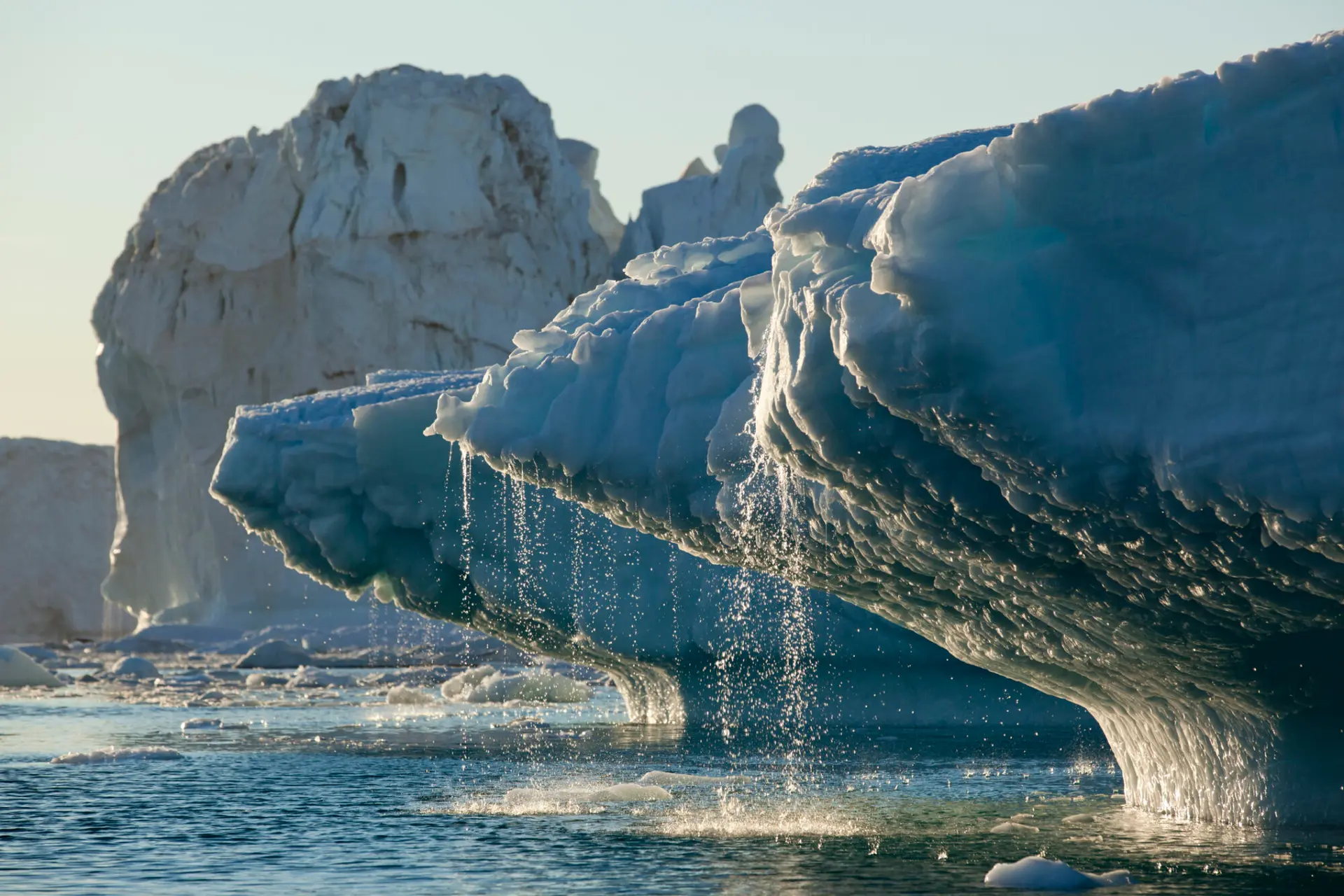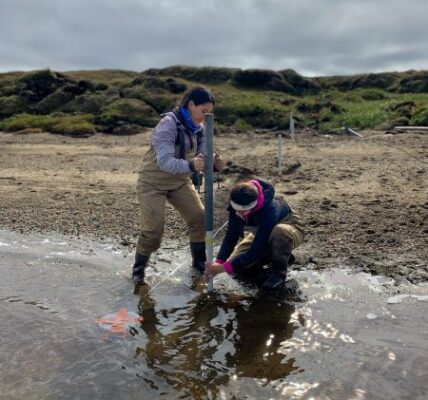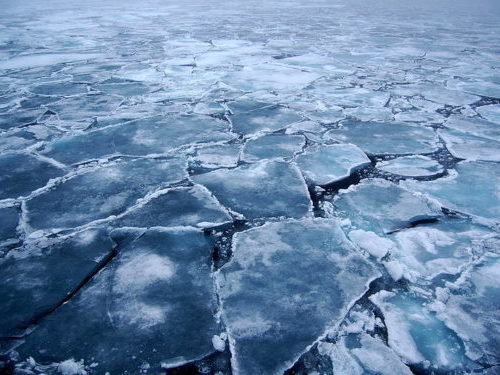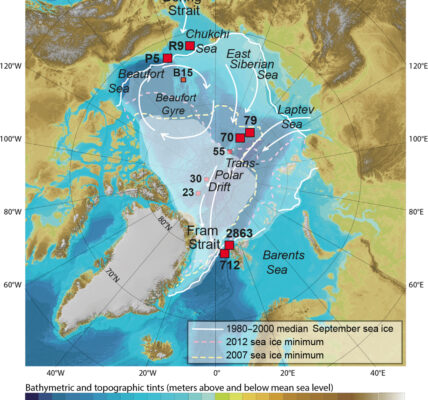President Joe Biden met with both U.K. Prime Minister Rishi Sunak and then King Charles this week to discuss climate change, and action on the Arctic should have been at the top of the agenda since the melting of Arctic sea ice is rapidly destabilizing the climate more powerfully than any other immediate cause.
As the Arctic’s reflective sea ice continues to melt, more and more heat is absorbed by the darker ocean underneath, disrupting the world’s weather and inflicting punishing and hugely expensive climate impacts in the U.S., U.K. and around the globe.
The loss of sea ice also is rearranging geopolitical power in very dangerous ways for the West, as Russia and China cooperate on newly opened Arctic sea lanes and plot to jointly exploit oil, gas and other minerals made more accessible as the ice disappears.
But there is still a choice: temporary riches from oil and gas for a few, or planetary safety for all. This should be an easy call. But it doesn’t seem to be.
The U.K. is struggling to import more oil and gas as its own supplies peter out. The government seems to think that more oil and gas from the Arctic will help. It’s not clear what the logic is, especially given the spectacular success of clean energy, including on cost. What is clear is that the U.K. is not doing enough to help protect the Arctic’s reflective sea ice, which is the key to global climate stabilization.
A good place to start would be to face the catastrophic consequences of losing the climate protection the Arctic’s reflective ice shield provides. Under current policies, the Grantham Institute at the London School of Economics estimates that “the total cost of climate change damages to the UK [will] increase from 1.1% of GDP at present to 3.3% by 2050 and at least 7.4% by 2100.” Simply on domestic economic grounds, the U.K. should save Arctic sea ice.
But the Grantham Institute goes on to warn that “the greatest risk to the U.K. under current policies is from catastrophic disruption to the global economic system.” And catastrophic disruption is exactly what losing the Arctic sea ice will bring when climate feedbacks push the planet past a series of non-linear tipping points on the way to a hothouse future in which half the population will live in places too hot for human survival. The Grantham Institute and McKinsey calculate that the loss of the Arctic ice will have severe impacts on the British economy and energy security as extreme weather strains the U.K. system and causes thousands of excess deaths.
That may be an understatement: According to last week’s analysis from Exeter University, climate modeling in financial services is significantly underestimating climate risk by excluding the most severe impacts, such as sea-level rise, heat stress, and climate tipping points, where warming becomes self-perpetuating as in the loss of Arctic sea ice.
The bottom line Is that the U.K. cannot protect itself unless it protects the Arctic. Nor can the United States. The Arctic is warming four times faster than the global average in a phenomenon called Arctic amplification, which is leading to the loss of snow and ice and its reflective benefit at a continental scale. As the ice shield melts and darker water absorbs more heat, this is causing a self-amplifying climate feedback loop that is already contributing to extreme weather events around the world.
The Arctic is the weakest link in the chain of climate resilience, one that could be broken in 10 to 15 years, according to the latest science. We’ve already lost half of the summer Arctic sea ice as measured in September, with the risk that the month of September will be ice-free within 10 to 15 years. The strong multi-year ice is down to less than 5%.
In a terrifying calculation, scientists explain that when all of the Arctic sea ice is lost for the sunlit months, it will add the warming equivalent of 1 trillion tons of carbon dioxide, or 25 years of climate emissions at today’s rate. Loss of the Arctic’s land-based snow would likely double the amount of warming. Yet, the rate of loss of Arctic ice could be further accelerated if Russia is allowed to implement and expand its Arctic development strategy. Arctic warming is also starting another unfortunate feedback as permafrost starts to thaw, releasing ancient stores of methane, carbon dioxide and nitrous oxide.
As a key member of the Arctic Council and NATO member, the U.S. has a crucial role in Arctic protection. So does the U.K. as a council observer and NATO member. But rather than leading the charge, the U.K. so far is prioritizing short-term economic opportunities over climate safety as it promotes development in the Arctic in its “Looking North” policy.
Further development and commercialization in the Arctic threaten the U.K.’s energy security and increases climate and security risks. TheU.K. should take the lead on ambitious climate action and global collaboration to conserve the world’s critical reflective ice shield.
Swift, coordinated action is needed by the Arctic Council and NATO members, led by the U.S. and U.K., to enact ambitious fast-acting climate policies, starting with targeted reductions of methane emissions. Cutting methane and the other super climate pollutants — hydrofluorocarbon refrigerants, tropospheric ozone, or smog and black carbon soot — can cut the rate of Arctic warming by two-thirds and help ensure the preservation of a frozen Arctic and the strategic interests of NATO members.
The U.K.’s conservative government, in particular, however, remains reticent to take more ambitious steps to protect the region through its domestic Arctic policy and its international and multilateral commitments. While the U.K. did sign the Global Methane Pledge and could reduce its methane emissions by 43% by 2030 if it chose to do so — exceeding the pledge’s goals — it’s only on track to cut them by 14% and has rejected joining the pledge’s methane finance sprint.
The U.S., U.K. and NATO leaders and others around the world must recognize that climate protection in the Arctic has become the ultimate national and global security and economic issue. In fact, action on it will determine whether countries and peoples across the globe can live in safety during this century and beyond — or suffer unimaginable destabilization, poverty, starvation and the breakdown of global order.
In short, climate is the world’s leading security and economic priority, and it requires saving the Arctic. It’s time for the United States and Great Britain to use their special relationship to act.
Paul Bledsoe is a professorial lecturer at American University’s Center for Environmental Policy, a strategic adviser at the Progressive Policy Institute and a former Clinton White House climate official.
Durwood Zaelke is president of the Institute for Governance & Sustainable Development (IGSD) in Washington, D.C. and Paris, as well as an adjunct professor at the University of California, Santa Barbara Bren School of Environmental Science & Management.
Zerin Osho is the director of the India Program at IGSD, with more than a decade of experience in government relations in the United Nations and in several positions across different ministries in India.





Your message is loud and clear – we must act now to save our planet from the catastrophic effects of a melting Arctic. Thank you for bringing this crucial issue to our attention.